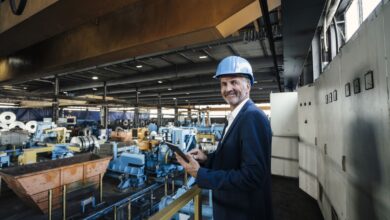IFS Charts AI-Driven Transformation Across MEA

As Middle East and Africa industries accelerate digital transformation to meet ambitious national visions, IFS is positioning itself at the forefront with Industrial AI solutions that promise immediate ROI. Hannes Liebe, Regional President for APJMEA at IFS, discusses how the company’s latest innovations – from IFS.ai to strategic acquisitions of TheLoops and Poka – are reshaping asset-intensive industries and supporting regional digitalization goals
What makes the IFS Connect MEA 2025 event significant for customers in the region?
IFS Connect MEA 2025 arrives at a pivotal moment for the Middle East and Africa, as industries accelerate digital transformation to deliver on ambitious national visions such as Saudi Vision 2030. The event will bring together over 300 executives, partners, and industry leaders, underscoring our long-term commitment to Saudi Arabia and the wider MEA market. It will showcase our Industrial AI innovations, including IFS.ai, Nexus Black, TheLoops, and 7bridges, which are already enabling predictive intelligence, closed-loop automation, and real-time decision-making for asset- and service-intensive industries.
Customers will also gain exclusive insights into our newest release IFS Cloud 25R1 capabilities, hear real-world success stories, and access sector-specific strategies to drive efficiency, resilience, and growth. Finally, the event reflects our commitment to local talent development, as we celebrate the achievements of 20 Saudi graduates from our Technology Training Program with Saudi Business Machines (SBM).
What are the key pillars of your Saudi Arabia strategy, and how are strategic partnerships, like the one with Saudi Business Machines (SBM), essential to solidifying your customer base and aligning with initiatives like Saudi Vision 2030?
Saudi Arabia is a cornerstone of our MEA growth strategy, and our focus here is built on three pillars:
- Deep localization – ensuring our solutions meet the regulatory, cultural, and operational needs of the Saudi market.
- Customer-centric innovation – bringing industrial AI capabilities that help organizations transform their operations in line with Vision 2030’s goals for efficiency, sustainability, and digitalization.
- Strong ecosystem partnerships – IFS has built a robust global network of strategic alliances with leading partners such as Accenture, PwC, Deloitte, Tech Mahindra, TCS, and Infosys. At the same time, we recognize the critical importance of strong local partnerships. This is why we are working closely with respected regional leaders such as Saudi Business Machines (SBM), who bring unmatched local expertise and reach – combining their trusted position in the Kingdom with IFS’s industry-leading software solutions.
How does IFS.ai in IFS Cloud 25R1 help customers in asset and service-intensive industries quickly get value from AI?
IFS.ai in IFS Cloud 25R1 is designed with one clear objective: delivering value from AI at speed. Many organizations struggle to move from AI experimentation to measurable business outcomes. With IFS.ai, we embed AI capabilities directly into industry workflows, so customers don’t have to “bolt on” separate AI tools.
Whether it’s predicting asset failures, optimizing field service schedules, or automating repetitive workflows, customers can start seeing ROI immediately because the AI is contextualized, explainable, and designed to work within their existing processes.
How is IFS.ai reshaping how businesses manage mission-critical assets, workflows, and services?
IFS history is deeply entrenched in asset heavy industries. We build software that does the job when it most matters. Therefore, IFS.ai is not just a feature; or a technological gimmick. We believe, it’s simply put the new way of working. That’s why it is deeply embedded into our industry solutions and used “in the moment” not as a sole add-on. IN real life that means we are combining predictive analytics, generative AI, and agentic AI, helping businesses to move from reactive to proactive management of their mission-critical assets and services.
Result is fewer unplanned outages, more efficient use of existing resources, and much faster decision-making. For example, an energy company can predict now a turbine failure before it happens, while a service provider can dynamically adjust workforce deployment in real time to respond. That end to end link makes the difference. Ultimately, IFS.ai is enabling businesses to run more resilient and sustainable operations while keeping customer satisfaction at the core.
With the acquisition of TheLoops, how does IFS now offer a unique AI Agentic platform?
IFS’s acquisition of TheLoops marks a transformative leap in how the company delivers Industrial AI. It enables us to deliver a unique agentic AI platform that transforms enterprise software from passive tracking tools into active digital co-workers.
These AI agents are semantically aware, autonomous, and designed to operate securely within industrial workflows, offering real-time decision-making, predictive maintenance, and operational efficiency. This agentic model enables IFS to embed AI agents directly into its industrial suite, creating a digital workforce that is contextual, compliant, and customer-centric.
Why is enabling businesses to measure productivity so important, and how does the acquisition of Poka help?
You can’t improve what you can’t measure — and that’s why productivity is such a critical metric. In industries with large frontline workforces, visibility into productivity gaps directly impacts efficiency, safety, and profitability. Our acquisition of Poka brings a proven solution for workforce connectivity and productivity measurement into the IFS portfolio.
Poka empowers frontline workers whilst they are on the job with digital tools to collaborate, share knowledge, and resolve issues faster, while giving management real-time visibility into performance. This not only drives higher productivity but also supports workforce engagement and upskilling — which are vital for long-term success in industrial organizations.




